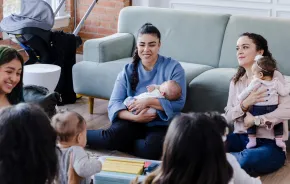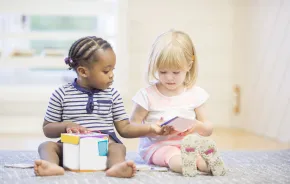 Fifteen-month-old Elijah Jones knows when things aren’t fair. If everybody else gets a regular chair, he doesn’t want a booster. If everybody else gets peas, he wants some, too. If he has a lollipop, he likes to trade licks, and often shoves a half-finished, spit-covered lollipop into his surprised mother’s mouth.
Fifteen-month-old Elijah Jones knows when things aren’t fair. If everybody else gets a regular chair, he doesn’t want a booster. If everybody else gets peas, he wants some, too. If he has a lollipop, he likes to trade licks, and often shoves a half-finished, spit-covered lollipop into his surprised mother’s mouth.
Elijah’s sense of fairness doesn’t surprise Jessica Sommerville, Ph.D., a University of Washington associate professor and the associate director for the Foundations for Social, Emotional & Cognitive Competence at the Center for Child and Family Well-Being. After all, she points out, research shows evidence of sharing in babies as young as 8 months old; helping and cooperation in 1-year-olds; and sensitivity to fairness in 3-year-olds.
Because of these findings, and because additional research shows that babies seem to know a lot more about the social world than once thought, Sommerville and other researchers are taking a close look at the way very young children perceive fairness.
Studies on infants showing a sense of fairness
In a recent study, Sommerville, along with doctoral student Marco Schmidt of the Max Planck Institute for Evolutionary Anthropology, watched 15-month-old babies watching videos of people receiving equal or unequal portions of food. All the babies stared longer at the scenes with unequal portions (some stared especially long), which, according to the study’s authors, indicates that the infants expected the food to be equally distributed.
In the second test, the same babies selected a toy from two different toys. A researcher then asked, “Can I have one?” Twelve babies handed over the toy they’d picked, apparently sharing their favorite. Fourteen babies kept their favorite toy and shared the other one. According to the authors, most of the babies who shared their favorite toy seemed surprised by those who didn’t. The authors concluded that the babies’ sensitivity to fairness “was related to whether they shared toys altruistically or selfishly.” In other words, the babies’ generosity seemed to correlate with their sense of fairness.
Luca Surian, Ph.D., researched babies’ sense of fairness in Italy. In a study he conducted with graduate student Alessandra Geraci, 16-month-old babies watched a cartoon of characters that shared equally or unequally, and looked longer at the equal sharers. When presented with pictures of these characters, most of the babies chose the equal sharers.
Another study indicates that babies’ sense of fairness extends beyond portion awareness. In this test, 21-month-old babies watched while two volunteers were asked to clean up toys and then received stickers. If one volunteer did all the work, but both received stickers, babies stared twice as long, evidently showing surprise. The babies were linking the work with the reward — and were surprised when the reward seemed unfair, the researchers say.
 Infants learning social norms
Infants learning social norms
Infants learn about social norms — maybe even moral norms — before they can engage in complex conversations, says Sommerville. They probably pick up these norms by observing how people, especially caregivers, interact with others. Surian thinks babies understand a concept long before putting it into action. A child who won’t share her cookies, for example, might still be able to tell whether those around her are acting fairly.
These and other recent findings, Sommerville says, “suggest that infants are highly social and motivated to figure out how the social world works.” And adults can help foster that social awareness. For instance, infants might learn more about fairness and generosity through sharing games, with adults passing toys back and forth with babies, or asking, “Can I have one?”
Games like these have already started teaching a Redmond 8-month-old to share. When he feeds his mother a piece of cereal, she exclaims how yummy it is, and he learns to offer more.
Another Redmond mother, Joy Walker, encourages her 17-month-old daughter, Hana, to practice sharing. If Hana gives Joy a block, Joy asks her to give one to Daddy, too.
Surian says parents can also help children practice sharing together. For instance, one child could divide up treats, and the other children could choose, learning together how to create solutions that please everyone. Older children can learn about the way their actions affect others, he says. He suggests that parents who see children refusing to share could point out the way their playmates feel — and help their children to develop their sense of fairness.
Both researchers understand that babies’ sense of fairness is only a part of overall baby development. Surian hopes to help parents realize how marvelous and complex their children’s minds are, so they’ll be motivated to spend more time talking and playing with their kids. What might seem like useless play or an annoying question, he cautions, “is, for the child, a precious learning opportunity.”
As a mother of three and the creator of candyexperiments.com, Loralee Leavitt loves exploring ways to help children learn. Her book, Candy Experiments, will be published January 2012.











